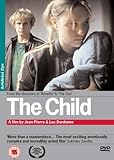Eye For Film >> Movies >> The Child (2005) Film Review
Following on from The Promise (1996), Rosetta (1999) and The Son (2002), the Dardenne brothers continue to specialise in intense, non-judgmental morality tales about the downtrodden and marginalised with their latest film, The Child (L'Enfant), an affecting slice of Belgian neo-realism, set amidst the pawnshops, car parks and by-passes of an unnamed industrial town.
Young Sonia (Deborah Francois) arrives from hospital, cradling newborn son Jimmy, only to find herself shut out of her own apartment, which her boyfriend Bruno (Jeremie Renier) has sublet to strangers. Homeless, Bruno lives from day to day, handling a small ring of schoolboys, who help him commit acts of petty theft, and supplementing his criminal income with Sonia's benefit payments. Though generous to a fault, the work shy antihero is almost pathological in his mendacity and fecklessness, and certainly not yet ready to be a father, as becomes painfully clear when he decides, without even consulting Sonia, to sell Jimmy for adoption on the black market. It is a thoughtless act and its consequences lead Bruno to grow up for the first time.

The Child may begin with the sound of a baby crying, but it is Bruno's tears with which it concludes, and it is his childishness, more than anything else, to which the film's title alludes, even if by the end he has undergone a certain coming of age. His endless clowning, his superficiality, his compulsive lying, his lack of affect and his inability to admit, or even grasp, fault, all mark Bruno out to be as juvenile as the schoolboys whose company he keeps, so that the scenes in which he is left alone to look after little Jimmy thrill with the same sort of horrific tension as the security footage of toddler Jamie Bulger being escorted by 10-year-old boys. In contrast, Sonia, though capable of her own fair share of tomfoolery, knows when it is time to put away childish things and which of her two "children" needs to come first.
A plain style is the hardest to sustain for the duration of a feature film, but the Dardennes have managed to concoct an engaging and often suspenseful drama without ever calling upon fancy camerawork, sensational performances, or even so much as a musical score. Such artfully low-key naturalism, combined with the protagonist's willful criminality, a thematic obsession with monetary exchange and a grimly redemptive ending, points to Robert Bresson's Pickpocket (1959) and L'Argent (1983); but unlike so many other pretenders to Bresson's throne, the Dardennes prove to be a match for the great French auteur, conjuring an underworld that is both real and allegorical, where the passage from childhood to adulthood is traced in the choices that characters make and the responsibilities that they come to accept.
No doubt some will wonder how so understated a domestic piece could have won the Palme d'Or at the 2005 Cannes Film Festival; but the simplest stories are always the hardest to tell, and the Dardenne brothers have once again demonstrated their mastery of minimalism.
Reviewed on: 10 Mar 2006


















